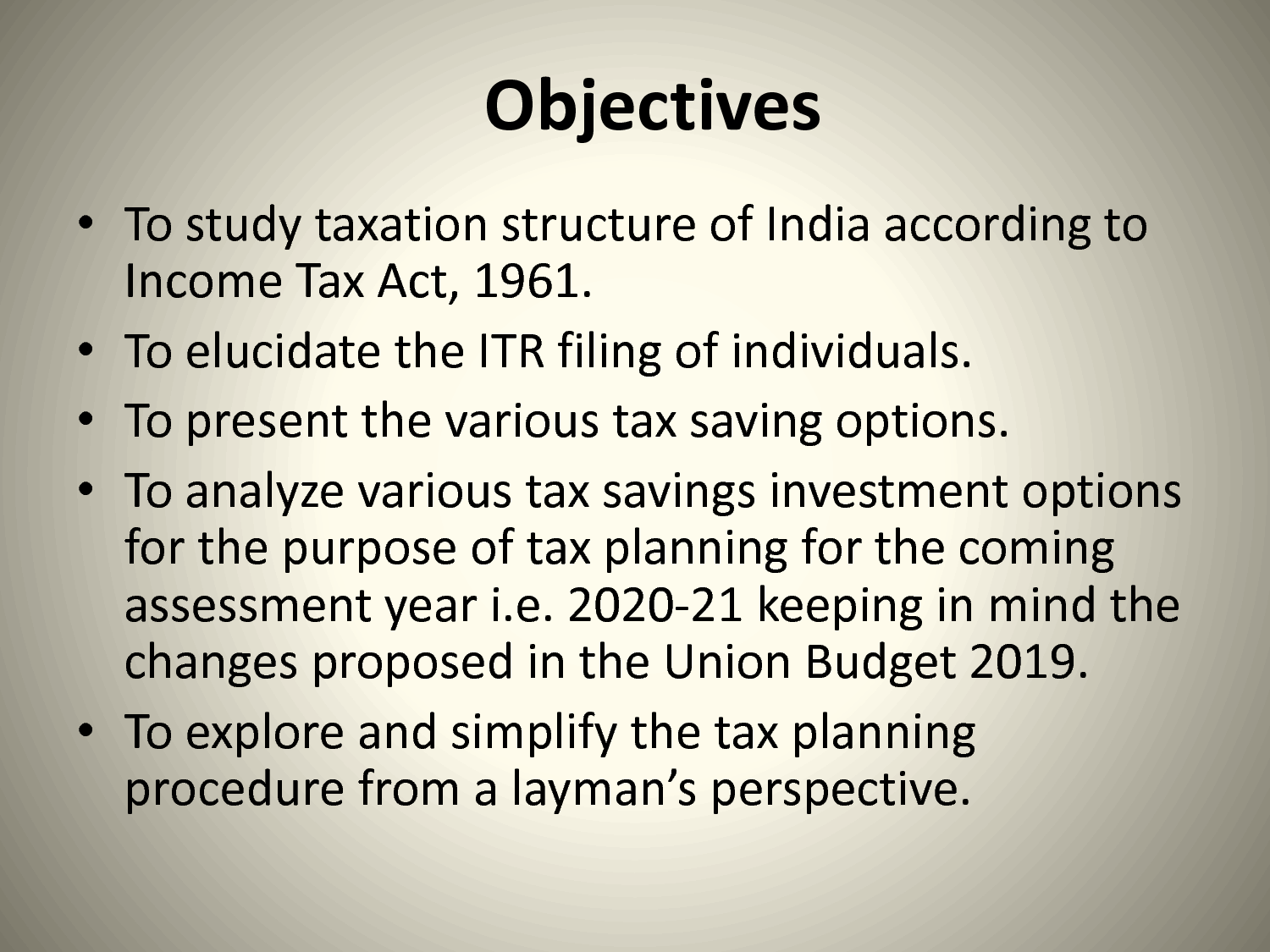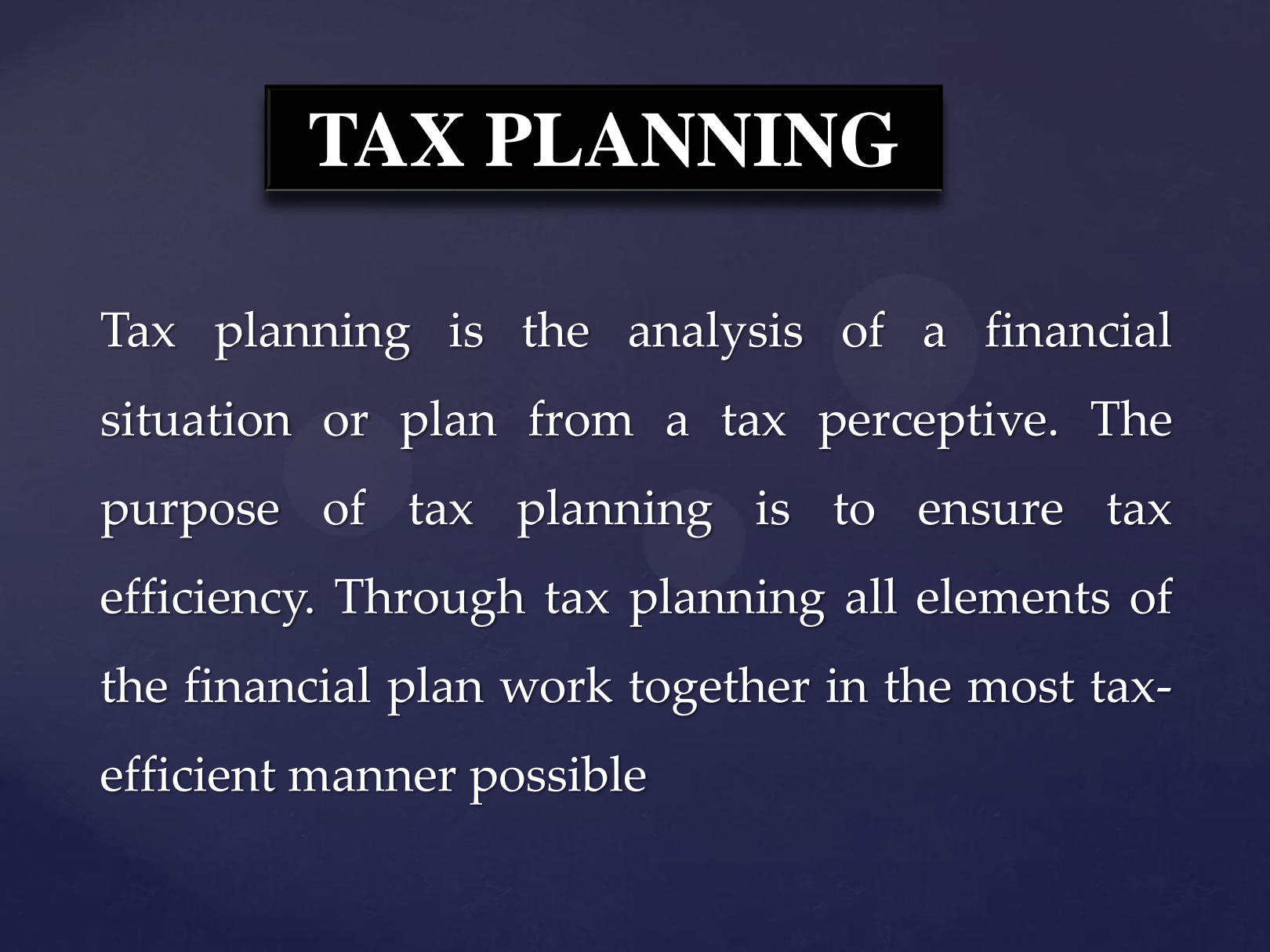

Finance
What Are The Objectives Of Tax Planning
Published: January 20, 2024
Learn the objectives of tax planning in finance and discover how it can optimize your financial strategies.
(Many of the links in this article redirect to a specific reviewed product. Your purchase of these products through affiliate links helps to generate commission for LiveWell, at no extra cost. Learn more)
Table of Contents
Introduction
When it comes to managing our finances, taxes play a crucial role. They have a significant impact on our personal and business finances. In this regard, tax planning becomes an essential tool for individuals and businesses to effectively manage their tax liabilities and optimize their financial outcomes.
Tax planning refers to the process of analyzing an individual’s or a business’s financial situation and using various strategies to legally minimize their tax liability. It involves making informed decisions about when, how, and where to make financial transactions in order to reduce the amount of taxes owed. This proactive approach helps individuals and businesses make the most of the tax benefits and incentives provided by the government while ensuring compliance with tax laws.
Effective tax planning is essential because it allows individuals and businesses to optimize their tax positions, allocate their resources efficiently, and ultimately achieve their financial objectives. It involves considering both short-term and long-term financial goals, as well as the legal and ethical aspects of tax management.
In this article, we will delve into the objectives of tax planning and explore how it can benefit individuals and businesses in managing their tax liabilities.
Definition of Tax Planning
Tax planning can be defined as the process of organizing one’s financial affairs in such a way that they can legally minimize their tax liability. It involves analyzing various financial aspects, such as income, expenses, investments, and deductions, in order to identify the most efficient tax strategies.
The primary goal of tax planning is to ensure that individuals and businesses pay the minimum amount of taxes required by law. It involves taking advantage of tax deductions, credits, exemptions, and other incentives provided by the government to reduce taxable income and lower overall tax liability.
Tax planning is not limited to individuals alone; businesses also engage in tax planning to maximize their profits and stay competitive. It includes strategies such as choosing the right business structure, implementing effective accounting methods, and utilizing tax breaks and incentives specific to their industry.
An effective tax plan takes into consideration both current and future tax obligations, and it is tailored to the unique financial circumstances of each individual or business. It requires a thorough understanding of tax laws, regulations, and changes that may affect tax liabilities.
It is important to note that tax planning should be distinguished from tax evasion, which refers to illegal activities undertaken to avoid paying taxes. Tax planning is a legitimate and ethical practice that helps individuals and businesses optimize their tax positions within the boundaries of the law. It aims to minimize tax liability while maintaining compliance with tax regulations established by the government.
Importance of Tax Planning
Tax planning is vital for individuals and businesses alike. It allows them to effectively manage their tax liabilities, optimize their financial outcomes, and achieve their overall financial objectives. Here are some key reasons why tax planning is important:
- Minimize Tax Liability: One of the primary objectives of tax planning is to minimize tax liability. By implementing strategic tax planning techniques, individuals and businesses can take advantage of tax deductions, credits, and exemptions to reduce their taxable income and ultimately lower the amount of taxes owed.
- Increase Tax Efficiency: Tax planning helps individuals and businesses improve their tax efficiency. By carefully analyzing their financial situation and utilizing appropriate tax strategies, they can optimize their tax positions and allocate their resources in a way that minimizes their tax burden.
- Ensure Compliance with Tax Laws: Tax laws can be intricate and ever-changing. Engaging in tax planning ensures that individuals and businesses are aware of their rights and obligations under the law. By staying current with tax regulations, they can make informed decisions that comply with legal requirements and avoid potential penalties.
- Optimize Cash Flow: Tax planning can significantly impact cash flow. By minimizing tax liabilities and strategically timing income and expenses, individuals and businesses can improve their cash flow management. This allows them to have more funds available for investment or other financial needs.
- Achieve Business Objectives: For businesses, tax planning plays a crucial role in achieving their financial goals. It helps them maximize profits, generate cash flow, and reinvest in their operations. By utilizing tax planning strategies, businesses can create a competitive advantage and enhance their long-term sustainability.
Overall, tax planning is key to optimizing financial outcomes, reducing tax burdens, and ensuring compliance with tax laws. It empowers individuals and businesses to make informed decisions about their finances, ultimately leading to increased financial stability and success.
Objectives of Tax Planning
Tax planning is undertaken with several objectives in mind. It involves strategic decision-making and the implementation of specific strategies to achieve these objectives. Here are the key objectives of tax planning:
- Minimize Tax Liability: The primary objective of tax planning is to minimize tax liability legally. This involves analyzing the financial situation, utilizing tax deductions, credits, exemptions, and other incentives to reduce taxable income and lower overall tax liability. By minimizing taxes, individuals and businesses can retain more of their income, increase their cash flow, and allocate funds towards other financial goals.
- Increase Tax Efficiency: Tax planning focuses on increasing tax efficiency. It involves optimizing financial transactions to maximize tax benefits and minimize tax obligations. This can be achieved through careful tax planning strategies such as timing income and expenses, utilizing tax-efficient investment vehicles, and maximizing deductions.
- Ensure Compliance with Tax Laws: Compliance with tax laws is an essential objective of tax planning. It involves understanding and following the tax regulations of the jurisdiction in which individuals or businesses operate. By engaging in tax planning, individuals and businesses can ensure that they are in full compliance with tax laws, avoiding penalties and legal issues that may arise from non-compliance.
- Optimize Cash Flow: Tax planning aims to optimize cash flow by strategically managing income and expenses. By planning financial transactions and taking advantage of tax deductions, individuals and businesses can improve their cash flow position. This allows for better financial management, investment opportunities, and overall financial stability.
- Achieve Business Objectives: For businesses, tax planning helps to achieve their specific financial objectives. This includes maximizing profits, reducing tax liabilities, and reinvesting in growth opportunities. By engaging in tax planning, businesses can strategically structure their operations, take advantage of industry-specific tax incentives, and ensure long-term financial sustainability.
By focusing on these objectives, individuals and businesses can effectively manage their tax liabilities, optimize their financial outcomes, and improve their overall financial well-being. Tax planning plays a vital role in helping individuals and businesses make informed financial decisions and navigate the complex landscape of taxation.
Minimize Tax Liability
One of the primary objectives of tax planning is to minimize tax liability legally. Individuals and businesses strive to reduce the amount of taxes they owe by utilizing various tax planning strategies. Here are some key techniques used to minimize tax liability:
- Tax Deductions: Individuals and businesses can take advantage of tax deductions to reduce their taxable income. By identifying eligible deductions, such as mortgage interest, business expenses, or medical expenses, taxpayers can lower their overall tax liability.
- Tax Credits: Tax credits directly reduce the amount of taxes owed. They are often available for specific expenses or activities, such as child care expenses, education expenses, or renewable energy investments. By claiming applicable tax credits, individuals and businesses can significantly reduce their tax liability.
- Tax Exemptions: Tax exemptions provide individuals and businesses with a certain amount of income that is not subject to taxation. Common examples include personal exemptions, dependent exemptions, and certain types of investment income exemptions. By understanding and utilizing available exemptions, taxpayers can decrease their taxable income and ultimately lower their tax liability.
- Tax Planning for Investments: Individuals and businesses can strategize their investment decisions to minimize taxes. Techniques such as tax-loss harvesting, tax-efficient asset allocation, and utilizing tax-advantaged investment accounts can help reduce the tax impact on investment gains.
- Tax Planning for Retirement: By contributing to tax-advantaged retirement accounts, such as 401(k)s or Individual Retirement Accounts (IRAs), individuals can lower their taxable income and defer taxes until retirement when they may be in a lower tax bracket.
These are just a few examples of the strategies employed to minimize tax liability. It is important to consult with a tax professional or financial advisor to tailor tax planning strategies based on individual circumstances and goals. By implementing effective tax planning techniques, individuals and businesses can legally reduce their tax liability and keep more of their hard-earned money.
Increase Tax Efficiency
In addition to minimizing tax liability, another objective of tax planning is to increase tax efficiency. Tax efficiency focuses on optimizing financial transactions and utilizing strategies to reduce the overall tax burden. Here are some key techniques used to increase tax efficiency:
- Strategic Timing of Income and Expenses: Timing plays a crucial role in tax planning. By strategically timing income and expenses, individuals and businesses can minimize their tax liability. For example, deferring income to a future tax year or accelerating deductible expenses can help reduce taxable income in the current year.
- Utilizing Tax-Advantaged Accounts: Tax-advantaged accounts, such as Health Savings Accounts (HSAs) or Flexible Spending Accounts (FSAs), offer tax benefits for specific purposes. By contributing to these accounts, individuals can lower their taxable income and use the funds for qualified medical expenses.
- Asset Location Planning: Asset location planning involves strategically allocating investments and assets in a way that minimizes taxes. By understanding the tax implications of different types of investments and taxable accounts, individuals can optimize their portfolio to minimize taxable income and maximize after-tax returns.
- Tax-Efficient Investing: Tax-efficient investing focuses on maximizing after-tax returns. This can be achieved by investing in tax-efficient funds or considering the tax consequences of different investment strategies. By minimizing capital gains and maximizing tax-efficient investments, individuals can increase their tax efficiency.
- Optimizing Business Structure: For businesses, choosing the right business structure can have significant tax implications. By carefully considering the pros and cons of different structures, such as sole proprietorship, partnership, or corporation, businesses can optimize their tax positions and reduce their overall tax burden.
Increasing tax efficiency not only decreases the tax burden but also allows individuals and businesses to allocate their resources more effectively. It enables them to maximize their after-tax income and reinvest in growth opportunities, ultimately contributing to their overall financial success.
Ensure Compliance with Tax Laws
One of the crucial objectives of tax planning is to ensure compliance with tax laws. Tax laws can be complex and ever-changing, making it essential for individuals and businesses to stay informed and abide by the regulations set forth by the tax authorities. Here are some key aspects of tax planning that focus on ensuring compliance:
- Understanding Tax Regulations: Tax planning involves staying updated on the latest tax laws and regulations to ensure compliance. This includes being aware of any changes in tax codes, rates, deductions, and reporting requirements. Knowledge of the tax laws helps individuals and businesses make informed decisions and avoid potential penalties or disputes.
- Filing Accurate and Timely Tax Returns: Tax planning emphasizes filing accurate and timely tax returns to meet the deadlines set by the tax authorities. Proper record-keeping and documentation are crucial in ensuring the accuracy of tax returns. By carefully preparing and submitting tax returns on time, individuals and businesses demonstrate their commitment to compliance with tax laws.
- Maintaining Adequate Documentation: A key aspect of tax planning is maintaining proper documentation to support the information reported on tax returns. This includes keeping records of income, expenses, deductions, and any other relevant financial transactions. Adequate documentation serves as evidence in case of audits or inquiries from tax authorities.
- Seeking Professional Guidance: Consulting with tax professionals, such as accountants or tax advisors, can help ensure compliance with tax laws. These professionals have the expertise and knowledge to navigate the complexities of tax regulations and provide guidance tailored to individual or business needs. They can assist in implementing effective tax planning strategies and avoiding potential pitfalls.
- Responding to Tax Audits and Inquiries: Tax planning involves being prepared to respond to tax audits or inquiries from tax authorities. If selected for an audit, individuals and businesses must cooperate, provide requested information, and address any concerns raised by tax authorities. Proper documentation and professional assistance can be invaluable in these situations.
By prioritizing compliance with tax laws, individuals and businesses can avoid legal issues, penalties, and reputational damage. Tax planning ensures that taxpayers stay on the right side of the law and maintain their integrity and credibility in financial matters.
Optimize Cash Flow
Optimizing cash flow is an important objective of tax planning. Effective tax planning strategies can significantly impact cash flow by minimizing tax liabilities and strategically managing income and expenses. Here are some key ways tax planning can help optimize cash flow:
- Timing Income and Expenses: By strategically timing income and expenses, individuals and businesses can improve their cash flow. For example, deferring income to a future tax year or accelerating deductible expenses can help reduce taxable income in the current year, providing immediate cash flow benefits.
- Maximizing Deductions: Deductions can play a crucial role in optimizing cash flow. By identifying and maximizing eligible deductions, individuals and businesses can reduce their taxable income, resulting in lower tax obligations and increased cash flow.
- Utilizing Tax Credits: Tax credits directly reduce the amount of taxes owed and can have a positive impact on cash flow. By taking advantage of eligible tax credits, individuals and businesses can effectively lower their tax liability, freeing up cash that can be used for other financial needs.
- Investment Planning: Strategic investment planning can also contribute to optimizing cash flow. By considering tax-efficient investment options, such as tax-free municipal bonds or tax-advantaged retirement accounts, individuals can minimize the tax impact on investment returns and increase their cash flow.
- Business Expense Management: For businesses, managing expenses efficiently is key to optimizing cash flow. By analyzing and controlling business expenses, including overhead costs, inventory management, and vendor negotiations, businesses can increase their cash flow and have resources available for growth and expansion.
Optimizing cash flow through tax planning allows individuals and businesses to have more funds available for essential expenses, investments, savings, and other financial goals. It provides the flexibility and financial stability needed to navigate economic uncertainties and seize opportunities for growth.
Achieve Business Objectives
Tax planning is not only about minimizing tax liabilities; it also plays a crucial role in helping businesses achieve their broader financial objectives. By implementing effective tax planning strategies, businesses can optimize their financial outcomes and contribute to their overall success. Here are some key ways tax planning can help businesses achieve their objectives:
- Maximizing Profits: Tax planning strategies can help businesses maximize their profits by minimizing tax expenses. By identifying eligible deductions, credits, and incentives, businesses can reduce their taxable income and retain more of their earnings. This additional revenue can be reinvested in the business, used for research and development, or distributed to shareholders.
- Reducing Tax Liabilities: Tax planning helps businesses strategically minimize their tax liabilities within the boundaries of the law. By understanding the tax regulations applicable to their industry, taking advantage of available tax credits, and structuring their operations efficiently, businesses can significantly reduce their tax burden and increase their bottom line.
- Optimizing Cash Flow: Effective tax planning strategies positively impact cash flow for businesses. By strategically timing income and expenses, maximizing deductions and credits, and managing tax obligations, businesses can improve their cash flow position. This increased cash flow provides businesses with the liquidity needed for day-to-day operations, expansion, and investment opportunities.
- Enhancing Competitiveness: Tax planning can create a competitive advantage for businesses. By optimizing their tax positions, businesses can operate more efficiently, offer competitive pricing, invest in research and development, or expand their market presence. This enhanced competitiveness allows businesses to attract customers, retain talented employees, and achieve long-term growth.
- Ensuring Long-Term Sustainability: Strategic tax planning is crucial for ensuring the long-term sustainability of businesses. By considering the tax implications of business decisions, businesses can plan for future tax obligations and allocate resources effectively. This includes choosing the right business structure, engaging in succession planning, and preparing for potential changes in tax laws and regulations.
By aligning tax planning with their business objectives, businesses can create a solid foundation for growth, profitability, and long-term success. Tax planning is an essential tool that empowers businesses to optimize their financial outcomes, mitigate risks, and stay ahead in a competitive marketplace.
Conclusion
Tax planning is a critical aspect of managing personal and business finances. It involves utilizing various strategies to minimize tax liability, increase tax efficiency, ensure compliance with tax laws, optimize cash flow, and achieve broader financial objectives. By implementing effective tax planning techniques, individuals and businesses can navigate the complex tax landscape and make informed decisions to optimize their financial outcomes.
Reducing tax liability is a primary objective of tax planning. Through the strategic use of deductions, credits, exemptions, and timing of income and expenses, individuals and businesses can legally minimize their tax obligations. This not only helps to retain more income but also improves cash flow, allocates funds for investment and savings, and supports overall financial stability.
Tax planning also focuses on increasing tax efficiency. By strategically managing financial transactions, utilizing tax-advantaged accounts and investments, and optimizing business structures, individuals and businesses can maximize after-tax returns and utilize resources more effectively.
Compliance with tax laws is another crucial aspect of tax planning. Staying informed about tax regulations, filing accurate and timely tax returns, maintaining proper documentation, and seeking professional guidance ensures compliance and helps to avoid penalties and legal issues.
Optimizing cash flow is a key benefit of tax planning. By strategically timing income and expenses, maximizing deductions and credits, and managing tax obligations, individuals and businesses can improve their cash flow position. This provides the flexibility and financial resources needed for day-to-day operations, investments, and achieving financial goals.
For businesses, tax planning goes beyond minimizing taxes; it helps achieve broader financial objectives. By maximizing profits, reducing tax liabilities, enhancing cash flow, increasing competitiveness, and ensuring long-term sustainability, businesses can thrive in a competitive marketplace.
In conclusion, tax planning is an essential tool for individuals and businesses to effectively manage their tax liabilities, optimize financial outcomes, and achieve their overall financial objectives. By taking a proactive approach to tax planning and seeking professional guidance, individuals and businesses can navigate the complexities of the tax landscape and position themselves for long-term success.














